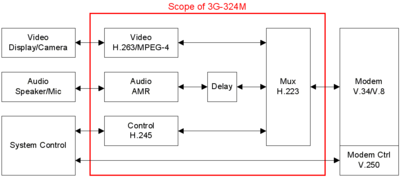3G-324M
3G-324M is the 3GPP umbrella protocol for video telephony in 3G mobile networks.
The 3G-324M protocol operates over an established circuit switched connection between two communicating peers. 3G-324M is an umbrella specification to enable conversational multimedia communication over Circuit Switched (CS) networks and has been adopted by the 3GPP. 3G-324M is based on the ITU-T H.324 specification for multimedia conferencing over Circuit switched networks.[1][2] 3G-324M is composed of the following sub-protocols:
- ITU-T H.245 for call control
- ITU-T H.223 for bit streams to data packets multiplexer/demultiplexer
- ITU-T H.223 Annex A and B for error handling of low and medium BER detection, correction and concealment
- ITU-T H.324 with Annexes A and C for operating in wireless environment
The 3G-324M specification using the Circuit switched network allows delay sensitive conversational multimedia services such as:
- Videoconferencing for personal and business use
- Multimedia entertainment services
- Telemedicine
- Surveillance
- Live Video Broadcasting– Cable TV On-the-Go
- Video-on-demand (movies, news clips)
3G-324M is agnostic to the actual Circuit switched network that uses it. It can run as easily over UMTS as well as TD-SCDMA networks.
3G-324M operating over a circuit switched channel between two communication peers guarantees the fixed-delay quality of service for multimedia communications. Combining Circuit switched 3G-324M services with packet-based SIP services such as presence can leverage the strength of both networks to enable new types of differentiated and innovative mobile 3G services.
Codecs
Audio Codec
- GSM Adaptive Multi-Rate, mandatory
- AMR-WB (G.722.2), optional
- ITU-T G.723.1, optional
Video Codec
- ITU-T H.263, mandatory
- ITU-T H.261, optional
- MPEG-4 part 2 simple profile 1 level 0, optional
- ITU-T H.264, optional
References
- ^ IMTC Press Coverage Archived 2017-03-31 at the Wayback Machine, International Multimedia Telecommunications Consortium (IMTC), April 1, 2001 to November 16, 2004.
- ^ Orr, Eli. News & Analysis: Understanding The 3G-324M Spec, EETimes.com website. January 21, 2003.
External links
- 3GPP TS 26.111 - Codec for circuit switched multimedia telephony service; Modifications to H.324
- IMTC 3G-324M AG - Interoperability and testing activity group covering the 3G-324M and H.324 protocol
- 3G-324M on Windows Mobile - An interesting article on the integration of 3G-324M into a Windows Mobile operating system
- Understanding the 3G-324M Spec Archived 2008-05-17 at the Wayback Machine - A good explanation on the specification of 3G-324M

